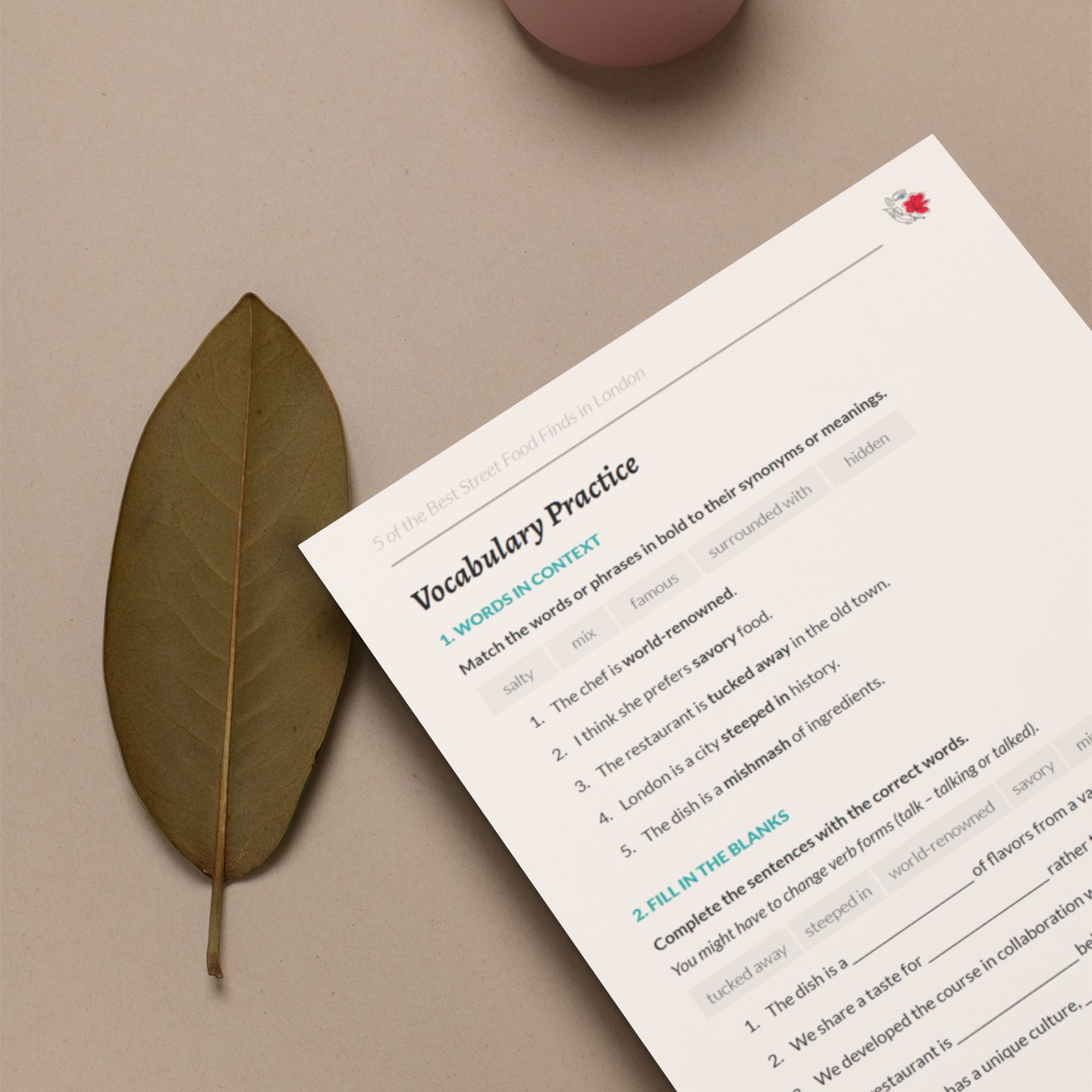Free ESL Lesson Plan: 7 Adjectives to Describe Feelings, Moods and Reactions
We all have lots of complicated emotions, and sometimes we need different adjectives in English besides “happy,” “sad,” and “angry.”
Because, if you’re like a lot of English learners I’ve met and taught, you sometimes feel like you rely on the same adjectives over and over to talk about how you feel. You might say you feel “angry” when you’re really just “annoyed.” Or you might say you feel “depressed” when you’re really just grumpy.
If that describes you, it’s not your fault! Historically, textbooks and English-learning materials haven’t done the best job of keeping up-to-date on expressions that English speakers actually use every day. That’s why we recommend doing what we do, which is turning to movies, television, videos, and podcasts, and articles to find new vocabulary.
But you don’t have to do that today, because we’ve done it for you!
In today’s post, we’re going to talk about 7 adjectives that English speakers actually use to talk about their feelings, reactions, and moods:
Delighted
Fuming
Stunned
Fired up
Grumpy
Awkward
Baffled
And, whether you’re an English learner or teacher, you should also check out the free ESL lesson plan we’ve created to accompany this article. We design our lesson plans so that they can be used for self-study, or in class with a teacher.
Feel free to send me a message if you have any questions, and I’ll be happy to help.
Continue reading and learn 7 adjectives to talk about your feelings.
Teaching English Just Got Easier!
Save hours of time with an organized collection of high quality, easy-prep ESL lesson plans and worksheets right at your fingertips.
7 ADJECTIVES TO TALK ABOUT HOW YOU FEEL IN ENGLISH
1. Delighted
When you feel delighted, you feel happy, joyful, and free. You might even feel a weightless sensation, hence the root-word “light.” It’s hard not to say the word “delight” without smiling. When you’re delighted with something, you probably feel like smiling, laughing, chuckling - maybe even snorting. Saying you’d be delighted to do something is like saying you’d be “thrilled” or “excited” to do it, so use this word carefully. And, if someone gives you a shirt or a tie or you hate, make sure you smile and tell them you are delighted with the gift, but keep the gift receipt.
Common Structures
Delighted to do something → “I’d be delighted to stay for dinner.”
Delighted (that) → “We were delighted that she passed the exam.”
Delighted with → “He was delighted with the present.”
Note: “Delighted” is never used with “very”; we use “absolutely” instead:
“I’m absolutely delighted to see you again.”
“I’m very delighted to see you again.”
2. Fuming
You’d know if ever been fuming. To be fuming is to be more than just a few degrees above annoyed; it's to be close to rage. If you’ve ever been cut off in traffic, stubbed your toe, or been so angry that you start to sweat, you’ve known the sensation of fuming. Usually the best thing to do when you’re fuming about something is to take a deep breath, count to ten, and avoid talking so you don’t say something you’ll regret.
Common Structures
Fuming about → “She’s still fuming about what happened yesterday.”
Fuming over → “I’m still fuming over what he said to me.”
3. Stunned
Something that makes you feel stunned usually makes your jaw drop or your heart stop for a second. It’s hard to use words at all when you feel “stunned” by something. It’s a similar feeling to being “shocked,” but it can be a little more neutral. It’s often used in a negative way, but it doesn’t always have to be. You can be stunned by the news that your best friend was dumped, but you can also be stunned by the news that your boss wants to give you a promotion. (Just make sure that you don’t have a stunned smile in the first situation.)
Common Structures
Stunned + by → “We were stunned by what we saw in the news.”
4. Fired up
Have you ever seen videos of people watching Jimi Hendrix or the Beatles perform? That’s what it looks like to get fired up in a good way. But you can also be fired up about negative things, too, like unfair treatment or injustice. At some point, you’ve probably had to turn the t.v. off because you were getting too fired up about all the bad news, or you had to take a break from social media because you were getting too fired up during that political discussion with your uncle. Then, it’s a good idea to get fired up for a good cause, like volunteering with your local conservation group or teaching an art therapy class.
Common Structures
Get + fired up → “Fans were getting fired up for this weekend’s big game.”
Fired up + about → “We are absolutely fired up about visiting Amsterdam again.”
Fired up + for → “They were so fired up for the concert.”
5. Grumpy
Mondays, right? Mondays often feel like an international celebration of grumpy feelings. Usually, when you feel grumpy, it’s not that you’re angry or annoyed about anything in particular. When you’re in a grumpy mood, everything annoys you, and people can usually tell. Caffeine usually helps when you feel grumpy, but if you don’t like caffeine, try taking a nap or having a snack. Because, I’m sorry to say, your family, friends, or coworkers don’t want to talk to you when you’re like this.
Common Structures
Grumpy + mood → “Sorry, I was in a grumpy mood yesterday.”
Feel + grumpy → “I was feeling grumpy and tired.”
6. Awkward
People can feel awkward in an awkward situation. For example, blind dates are almost always awkward for both people involved. And then there’s the part at the end of the date when you usually have to say, “You seem really nice, but I think we should just be friends.” That’s awkward, too. So, when you feel awkward, you feel like something is off and not quite right. And you’ve probably felt awkward or uncomfortable at a holiday family gathering, when everyone’s at the dinner table and no one wants to bring up the recent family drama or mention the fact that the chicken is too dry, so you just talk about the weather.
Common Structures
Feel + awkward → “His questions were making me feel awkward.”
Awkward + situation → “They put me in an awkward situation.”
7. Baffled
Have you ever felt so confused that you almost feel lost, even dizzy? That’s what it feels like to be baffled. Someone who is baffled at something might shake their head and say, “Wait...what?” You can be baffled by something when you can't believe it because it’s too shocking or wild, like when you hear a juicy piece of gossip. Just like the word “stunned,” we often use baffled in a negative context, but we can use it in more neutral contexts, too. Just remember that being baffled is kind of one of those “all or nothing” types of feelings; We don’t usually say “very” baffled. A person can be “a little” baffled or completely baffled. I know what you’re thinking: I’m baffled by English, sometimes, too.
Common Structures
Baffled + at → “I’m just baffled at how you can do all this work alone.”
Baffled + by → “Experts were baffled by their findings.”
Completely + baffled → “I was completely baffled by his decision.”
If you found this helpful, please share it with you friends! Thanks for reading and see you in the next post.
Transform Your Teaching
Become a member today, and together, let's embark on a journey that transforms not only your teaching but your entire way of life. Your adventure begins here!
About the Writer
Marta is an online ESL teacher who works with students from around the world. As a writer, language nerd, and content contributor for In English With Love, her mission is to empower English learners with knowledge and positivity.

















